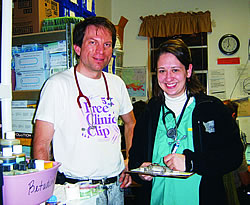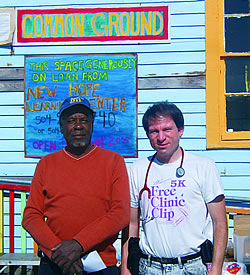|
Issue Contents :: The Last Word
Relief Efforts Find Common Ground
Volunteer clinic makes a world of difference for its Ninth Ward patients.
 As I wound my way through the streets of Mr. Alford’s Lower Ninth Ward neighborhood, I was overwhelmed. His resilience was amazing. True, he had been suicidal earlier this fall. But now he was showing me every detail of As I wound my way through the streets of Mr. Alford’s Lower Ninth Ward neighborhood, I was overwhelmed. His resilience was amazing. True, he had been suicidal earlier this fall. But now he was showing me every detail of
the destruction, glad to have me recording his stories and
photographing our tour this bright morning. His house
had floated into his backyard, and as
we picked our way through blackened household goods and furniture strewn topsy-turvy, I talked with him as matter-of-factly as I could. He went straight for his fishing tackle, still leaning in the corner of a room. “A little oil is all it will need,” he muttered, leading me into his mangled bedroom. “You aren’t afraid?” he then asked.
I spent two weeks in New Orleans
as a volunteer physician with Common Ground, a grassroots organization that grew from a first-aid station into a clinic and multi-service relief collective. The main clinic, which has treated nearly 100 patients a day, was housed in a mosque until shortly after my stay.
The medical situation in the city remains bleak. Most residents had few health services to begin with, and now they have nearly none. The hospitals are still closed, including the 200-year-old Charity Hospital, the only facility dedicated to the poor. Charity now runs emergency services in tents in the convention center. Our clinic serves a big need, and our patients, many of them older adults seeking prescription refills, are exceedingly appreciative.
 I met Mrs. Butler, who shared her grandmother’s recipes for okra gumbo. Mr. Alford, who arrived at the clinic with back pain and a swollen elbow, drove me to the remains of his house just a few days later. Another patient, Mrs. Johnson, stays in a FEMA trailer with her daughter. A man named Byron came in for shots and later drove me to his gutted house by the lake. Rosa came to our satellite clinic in a Latino church with a new diagnosis of diabetes; she was determined to avoid medications. A man with a badly cut finger fared well thanks to a volunteer Vietnamese medical student who spoke his language and performed her first sutures on his wound. We also had
an emotional visit by a vivacious young woman with a heroin addiction. I met Mrs. Butler, who shared her grandmother’s recipes for okra gumbo. Mr. Alford, who arrived at the clinic with back pain and a swollen elbow, drove me to the remains of his house just a few days later. Another patient, Mrs. Johnson, stays in a FEMA trailer with her daughter. A man named Byron came in for shots and later drove me to his gutted house by the lake. Rosa came to our satellite clinic in a Latino church with a new diagnosis of diabetes; she was determined to avoid medications. A man with a badly cut finger fared well thanks to a volunteer Vietnamese medical student who spoke his language and performed her first sutures on his wound. We also had
an emotional visit by a vivacious young woman with a heroin addiction.
In keeping with the counterculture nature of Common Ground, I worked alongside not only various medical professionals, but also acupuncturists, herbalists, masseuses, and Reiki healers. These volunteers were just as remarkable as the patients; many had left their jobs and moved to New Orleans for the long haul. In the mess hall of our FEMA tent city, we were
a mix of people thrown together by
disaster—volunteer medical workers, plumbers, caterers, and fundraisers sharing meals and shelter with city water workers, police officers, and National Guardsmen. The whole lot was a source of unending tales and good spirits.
One evening, following dinner at a restaurant, a storm began to brew, and we got lost driving home through the unlit streets. Back in my tent, listening to the snapping and roar of the wind and rain, I experienced a moment of true fear, thankful not to have beams and bricks overhead. I bolted outside and watched my tent blow apart; the two women next to me screamed as their tent collapsed. We straggled into the mess hall, dazed from the storm, ourselves and possessions scattered and soaked. I realized how lucky I was; my belongings were wet, but I could still
go home.
Well after I left New Orleans, I got a call from Mr. Alford. He said he believes his neighborhood shouldn’t be rebuilt. His wife said they were considering moving out of town, even through she had retained her job at a hotel. The loss was just too much.
Eric Fryxell is a family physician in Cleveland. He says that Common Ground continues to operate and is in need of volunteers. Health
workers can find information at www.cghc.org; others can visit www.commongroundrelief.org. Eric can be reached at eefryxell[at]hotmail.com
|





